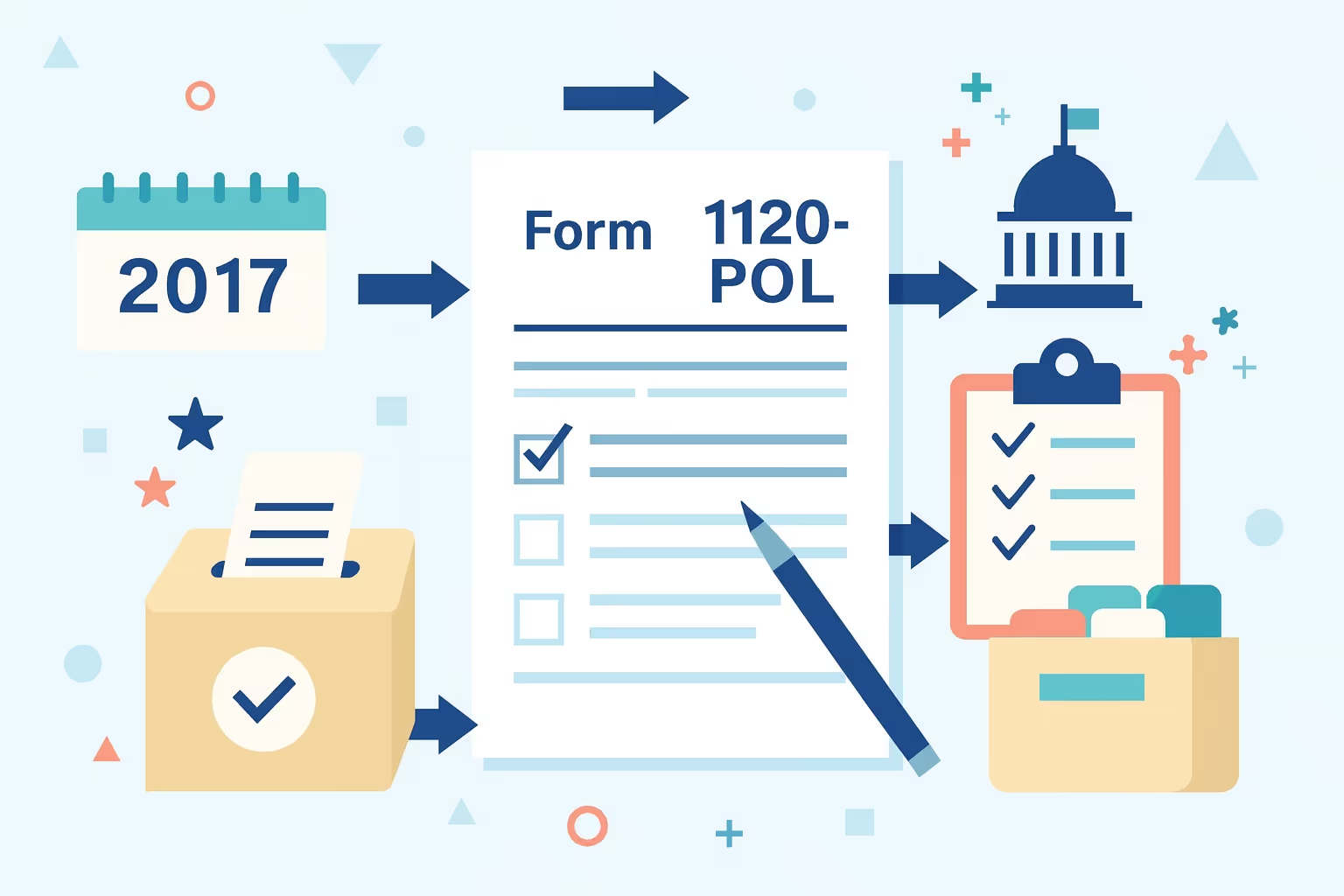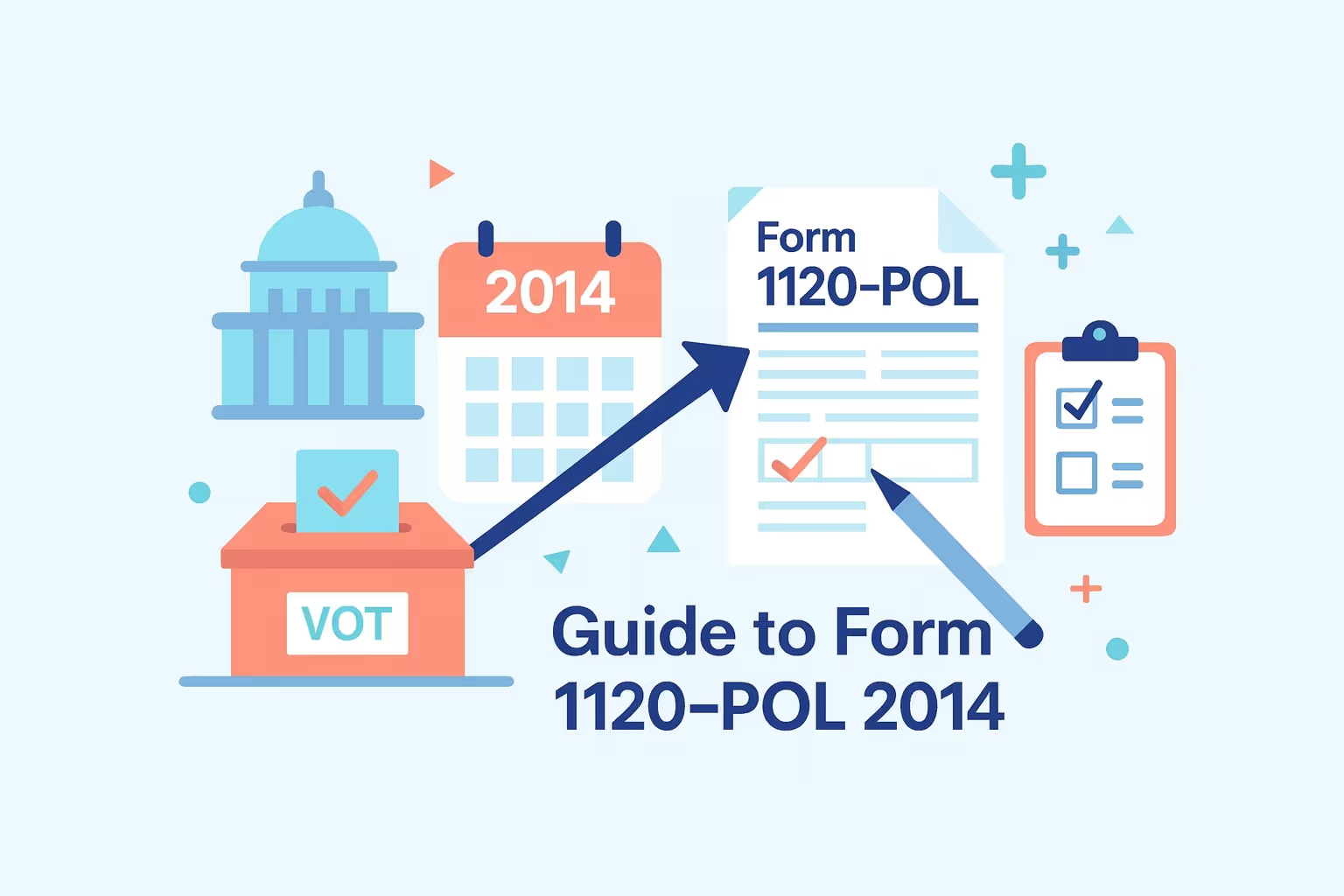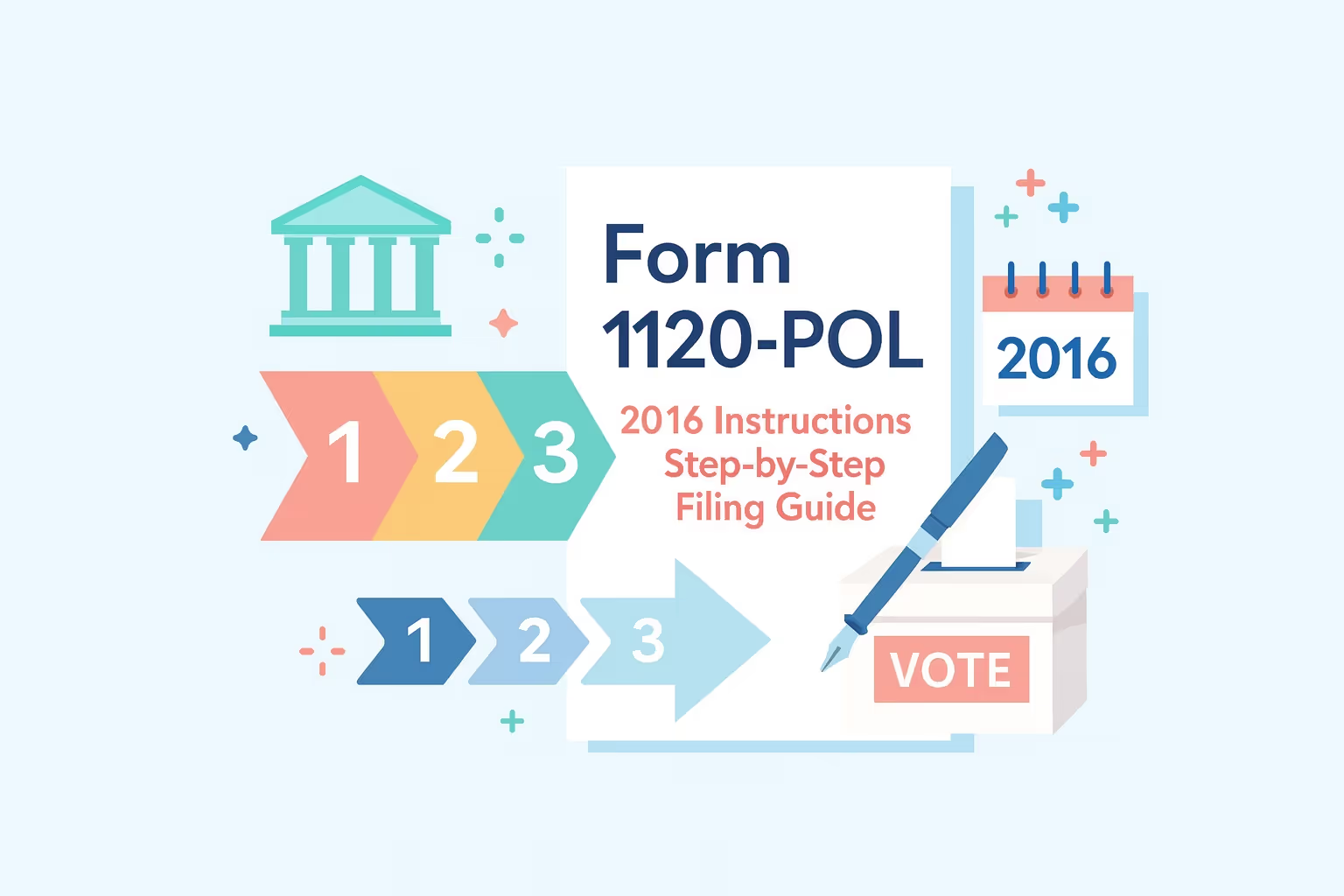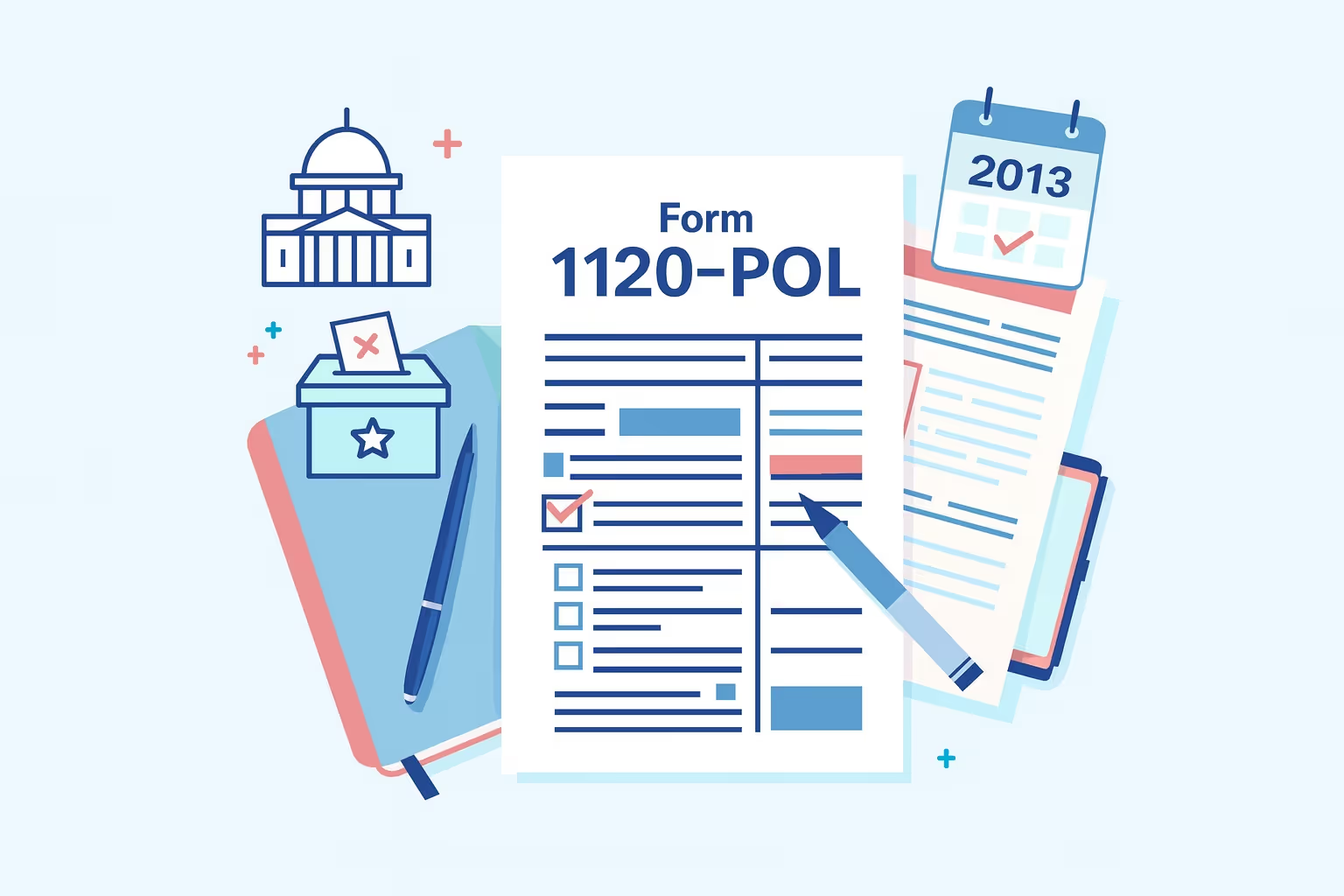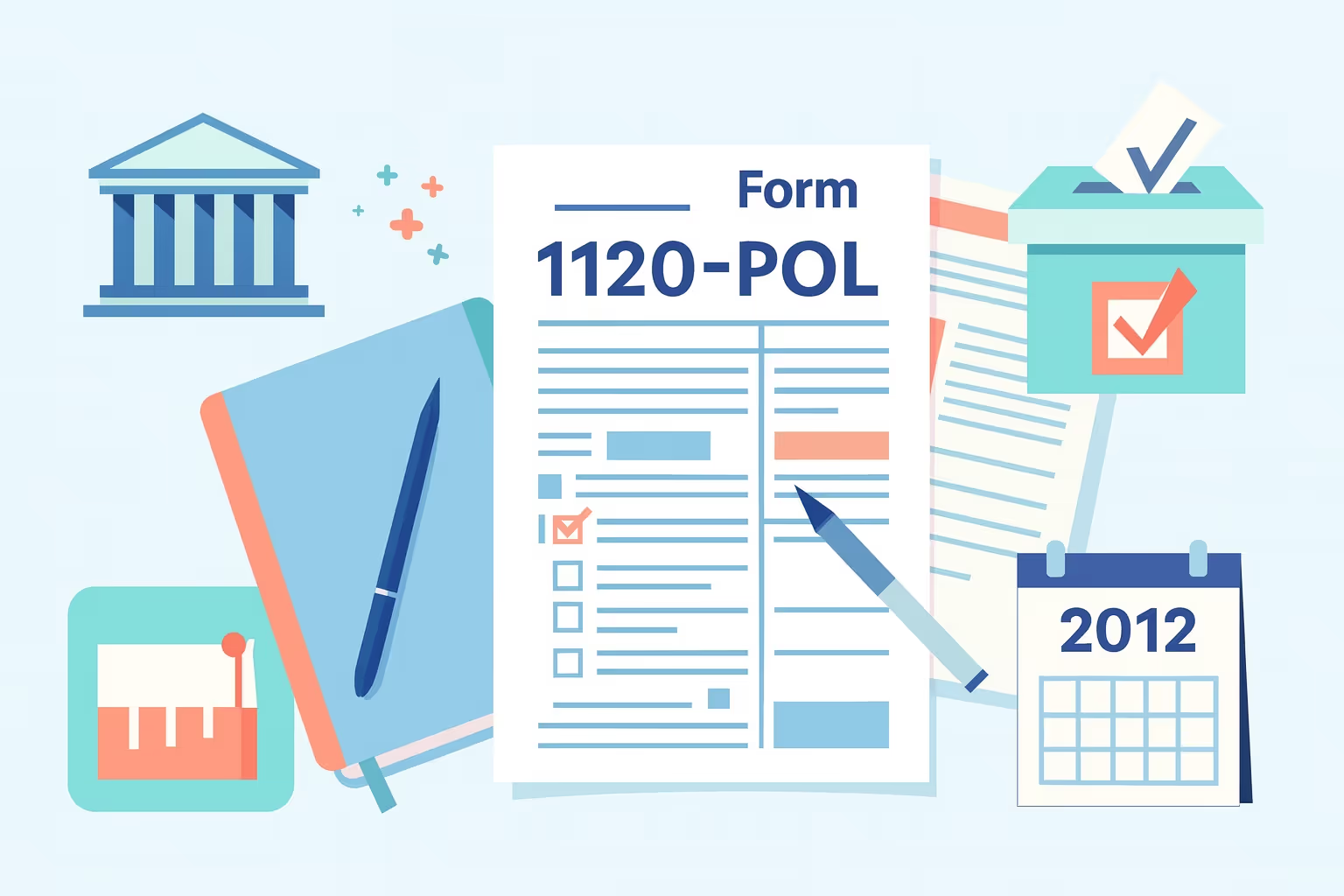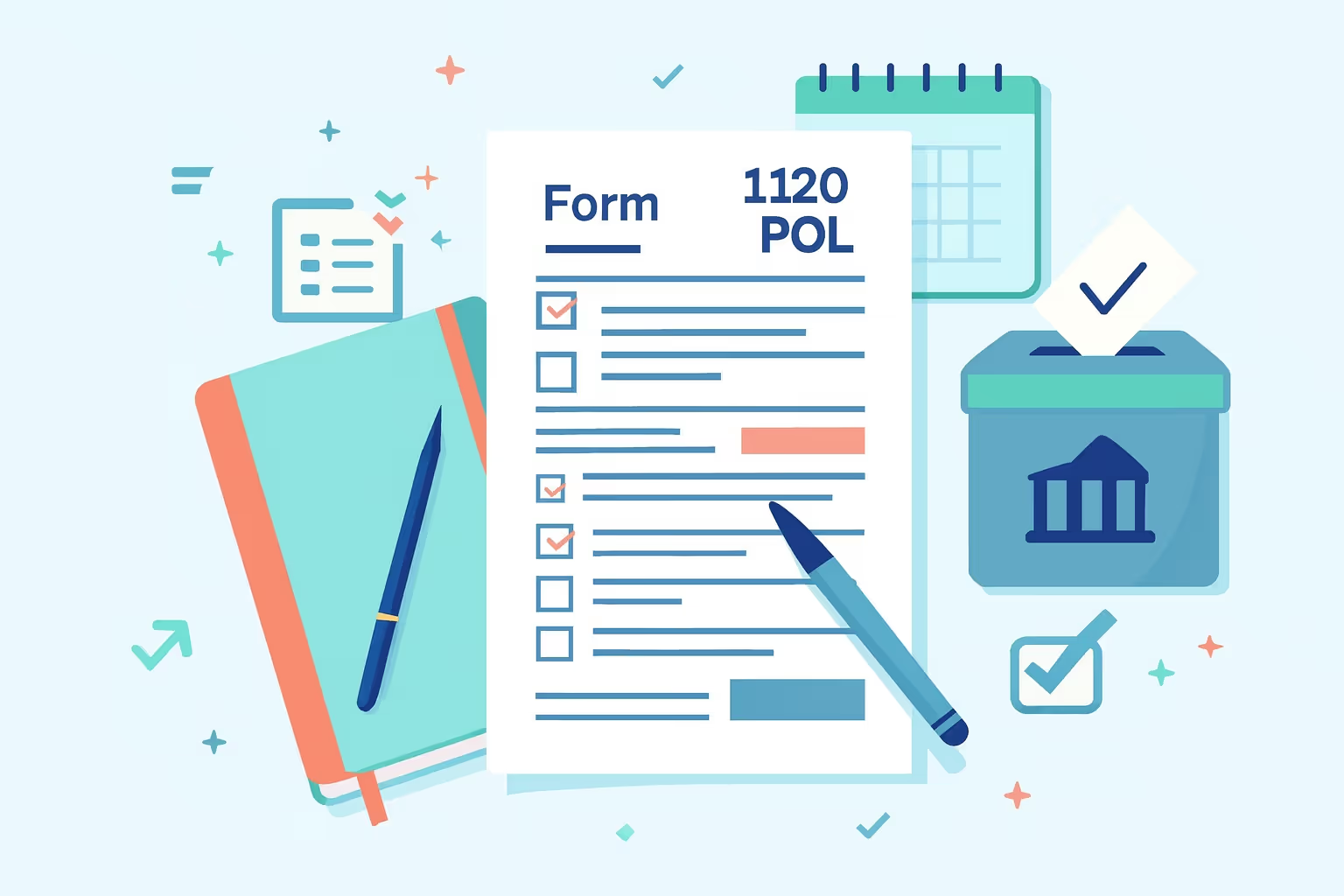
The Form 1120-POL is the U.S. federal income tax return filed by specific political organizations to report their political organization taxable income and calculate any income tax liability due under Section 527 of the Internal Revenue Code. This form is distinct from other nonprofit returns because it focuses only on the taxable portion of a political group’s income, such as investment earnings or rental proceeds unrelated to its exempt functions.
This guide is tailored for the 2020 tax year and describes the complete 2020 IRS filing instructions for political organizations. It highlights the filing requirements, deductions, reporting changes, and methods for complying. You can view the official IRS overview page about Form 1120-POL for reference.
Accuracy matters greatly in political organization filings. Mistakes or missed deadlines can trigger penalties, jeopardize exemption status, or cause unwanted audits. In the following sections, you’ll learn who must file, a step-by-step walkthrough of completing the form, how to submit or pay, and the key traps to avoid.
What Is Form 1120-POL?
Political organizations use Form 1120-POL, officially titled U.S. Income Tax Return for Certain Political Organizations, to report their political organization taxable income and any income tax liability under Section 527 of the Internal Revenue Code. This form applies to groups that earn taxable income from sources unrelated to their exempt political functions, such as investment income, rental income, or business activities unrelated to elections or political advocacy.
Form 1120-POL ensures that income outside a political organization’s exempt purpose is taxed fairly, maintaining compliance with federal law. Organizations use it to calculate taxable income, claim allowable deductions, and determine the total tax owed to the IRS. The official 2020 Form 1120-POL and filing instructions are available on the IRS website.
Who Must File Form 1120-POL
Not every political group must file Form 1120-POL. The IRS requires it in the following circumstances:
- Political organizations with taxable income greater than $100 after the specific deduction allowed under Section 527(c)(2). This includes major and minor political parties, committees, and local associations that generate taxable earnings.
- Exempt organizations—such as social welfare or labor groups—are treated as having political organization taxable income under Section 527(f)(1).
- Newsletter funds are established by elected officials or candidates who earn income beyond their exempt purpose.
These filers must report gross income, deductions, and tax due even if most of their funding comes from contributions used for political activities.
When Filing Isn’t Required
Some organizations are not required to file Form 1120-POL if they have no taxable income or operate in a dormant year. However, the IRS still allows optional filing in several cases:
- Zero taxable income: No tax is due when total income is minus allowable deductions.
- Dormant organizations: Groups with no income-producing activities during the tax year.
- Record-keeping benefits: Filing voluntarily can start the three-year statute of limitations period, helping the organization document its compliance history and demonstrate transparency.
Even when filing isn’t mandatory, many organizations submit the return to maintain a clear compliance record and ensure all tax-exempt activities remain classified adequately under Section 527 rules.
2020 Tax Year Highlights and Updates
The 2020 tax year introduced several significant changes that affected how political organizations complete and file Form 1120-POL. These updates reflected broader adjustments under the Internal Revenue Code and emphasized accurate reporting for all taxable and investment income earned during the year.
- Flat 21% Tax Rate
For 2020, all political organizations were subject to a flat 21% tax rate on taxable income. This rate applies to the total income after subtracting the $100 specific deduction allowed under Section 527. The unified rate simplified calculations and aligned political organization taxation with the federal corporate tax structure. - Qualified Opportunity Fund Reporting (Form 8997)
Organizations that invested in a Qualified Opportunity Fund (QOF) during 2020 must file Form 8997, Initial and Annual Statement of Qualified Opportunity Fund Investments. This form documented each investment’s opening and closing balance and ensured compliance with the opportunity zone reporting requirements. - Section 965 Transition Tax Provisions
Political organizations affected by the Section 965 transition tax had to include income from deferred foreign earnings. These organizations were required to complete Form 965 and any related schedules. - Global Intangible Low-Taxed Income (GILTI)
Political organizations that were U.S. shareholders in controlled foreign corporations needed to calculate and report GILTI on Form 8992.
These updates reinforced the IRS’s focus on transparency and accurate reporting for organizations managing complex or international investments.
Step-by-Step Guide to Completing Form 1120-POL
Step 1 — Gather required information
- Confirm your EIN, legal name, and mailing address match IRS records. Use the exact entity name on your EIN letter.
- Compile records of gross income from non-exempt sources, including investment income, taxable interest, rents, royalties, and capital gains.
- Separate exempt function income (contributions, membership dues used for political activities) from taxable amounts. Keep supporting schedules that show sources and allocations.
- Identify related filings that may apply, such as Forms 8871, 8872, and the 990 series, and confirm the applicable tax year.
Step 2 — Complete the header section
- Enter the calendar year “2020,” or your fiscal year beginning and ending dates.
- Provide the organization’s name, address, and EIN. List a responsible officer’s name and title.
- If you are amending, check any applicable boxes, such as "amended return," and include a brief explanation statement.
Step 3 — Report income (Lines 1–8)
- Lines 1–5: Report dividends, taxable interest, gross rents, gross royalties, and capital gain net income. Attach Schedule D if you have capital transactions.
- Line 7: Report “Other income” that is not an exempt function amount, including improperly segregated funds. Provide a detailed statement.
- Line 8: Add Lines 1 through 7 to determine total income. Do not include campaign contributions or other exempt function income on these lines.
- Example: A committee reports $2,000 in interest (Line 2), $800 in dividends (Line 1), and $200 in capital gain (Line 5). Line 8 totals $3,000.
Step 4 — Report deductions (Lines 9–16)
- Deduct only expenses directly connected to producing taxable income. Typical deductions include wages for staff who manage investments, rent on income-producing property, taxes and licenses, interest expense, repairs, and depreciation (attach Form 4562 if required).
- Do not deduct expenses tied to political activities, general administration, or fundraising for exempt functions. Those are not allocable against taxable income.
- Keep itemized statements for “Other deductions” on Line 15.
- Example continuation: The committee deducts $400 in wages, $150 in rent, $100 in taxes and licenses, $50 in depreciation, and $100 in other deductions. Line 16 totals $800.
Step 5 — Calculate taxable income and tax (Lines 17–23)
- Line 17: Subtract total deductions (Line 16) from total income (Line 8). Using the example, $3,000 − $800 = $2,200.
- For Section 501(c) organizations, follow Lines 17a–17c to limit taxable income to the smaller of net investment income or the aggregate amount spent on exempt functions.
- Line 18: Claim the $100 specific deduction (not allowed for newsletter funds). Example: $2,200 − $100 = $2,100.
- Line 19: Enter taxable income after the specific deduction. In the example, Line 19 is $2,100.
- Line 20: Compute the income tax at 21% of Line 19. Example: $2,100 × 0.21 = $441.
- Line 21: Enter any applicable credits, and attach required credit forms.
- Line 22: Subtract credits from Line 20 to determine total tax.
- Line 23: Report payments made, including estimated tax or amounts paid with extensions. If costs exceed tax, complete the overpayment and refund sections as directed by the Form 1120 POL 2020 instructions.
Final review checklist
- Reconfirm that only political organization taxable income appears on Lines 1–8. Exempt function amounts should be excluded or reclassified as required.
- Verify attachments: Schedule D, Form 4562, Form 4797, and any credit forms, depending on your facts.
- Ensure statements support “Other income” and “Other deductions,” and that allocations are documented.
- Verify the due date, the signature of a responsible officer, and the preparer's information, if applicable.
- Keep copies of the filed tax return, workpapers, and supporting documents for at least three years after filing to support compliance and future inquiries.
How to File Form 1120-POL
Filing Form 1120-POL correctly is essential for political organizations to stay in good standing with the IRS. Depending on the organization's preference and technical capabilities, the form can be filed electronically or on paper. Each method has specific steps and requirements to ensure compliance and timely processing.
Electronic Filing (Recommended)
The IRS encourages all political organizations to use electronic filing (e-file) for faster and more reliable submission. E-filing minimizes errors by validating data before submission and immediately confirming receipt. You can file electronically through:
- IRS Authorized e-File Providers: Licensed tax professionals or firms approved to submit returns on behalf of organizations.
- Modernized e-File (MeF) System: A secure web-based platform that accepts returns in XML format.
Benefits of e-filing include:
- Faster acknowledgment and reduced processing time.
- Built-in error checking that helps prevent rejections.
- Secure, encrypted transmission directly to the IRS.
- Options to schedule electronic payments at the same time you file.
Political organizations filing Form 1120-POL electronically should ensure that all supporting forms—such as Schedules D, Form 4562, and Form 4797—are in the correct digital format.
Paper Filing Instructions
Although electronic filing is preferred, paper submission remains available. To file by mail:
- Print the completed Form 1120-POL for the 2020 tax year.
- Attach all required schedules, forms, and statements in the correct order.
- Do not include payment with the return; instead, pay electronically through EFTPS.
- Sign and date the return. An unsigned form is considered incomplete and may delay processing.
Mailing addresses:
- U.S. filers:
Department of the Treasury
Internal Revenue Service Center
Ogden, UT 84201 - Foreign organizations:
Internal Revenue Service Center
P.O. Box 409101
Ogden, UT 84409
Filing deadlines:
- Calendar year filers: Due April 15, 2021
- Fiscal year filers: Due on the 15th day of the fourth month after the close of the fiscal year
If the return is due on a weekend or legal holiday, it is due the next business day. To request additional time, file Form 7004 by the original due date to obtain a six-month filing extension. However, remember that this extension applies only to filing, not payment.
Required Attachments and Supporting Schedules
When filing Form 1120-POL, political organizations must attach the correct schedules and forms to ensure their return is complete and accurate. Missing or incomplete attachments are among the most common reasons the IRS delays or rejects a return. Each supporting form serves a specific reporting purpose and must be appropriately labeled and sequenced behind the main form.
Common Required Schedules and Forms
- Schedule D (Form 1120)—Reports capital gains and losses from selling or exchanging investment property. Attached is a list of whether your organization sold securities, real estate, or other capital assets during the year.
- Form 4562 – Used to report depreciation and amortization on property or equipment used to produce taxable income.
- Form 4797 – Required when reporting gains or losses from selling business property, such as rental buildings or office equipment.
- Form 965 – Applies to organizations subject to the Section 965 transition tax on deferred foreign income.
- Form 8997 – Required for those holding Qualified Opportunity Fund (QOF) investments during the 2020 tax year.
Credit and Additional Forms
Attach credit forms if your organization claims specific tax credits, such as:
- Form 1118: Foreign Tax Credit
- Form 3800: General Business Credit
- Form 8834: Qualified Electric Vehicle Credit
- Form 8994: Employer Credit for Paid Family and Medical Leave
Supporting Statements
- Provide a detailed statement for “Other income” reported on Line 7.
- Itemize all “Other deductions” listed on Line 15 to show how each relates to taxable income.
- Include explanations for any material changes made to prior filings or amended returns.
Before filing, review all attachments for consistency. Each schedule should reference the tax year, EIN, and organization name. Correctly assembling and cross-referencing these forms supports transparency, helps verify calculations, and ensures full IRS compliance.
Common Mistakes and How to Avoid Them
Even well-organized tax-exempt organizations can make reporting errors when filing Form 1120-POL. Most problems arise from misclassifying income, overlooking deductions, or misunderstanding which activities must be accounted for on the return. The following are common mistakes and how to prevent them.
Mixing Exempt and Taxable Income
Many political organizations mistakenly include exempt function income, such as campaign contributions or membership dues, as taxable income. Only earnings from investments, rents, or other unrelated business activities should be reported on the form. Always separate exempt funds from taxable amounts to ensure accuracy.
Deducting Ineligible Expenses
Expenses linked to political campaigns or exempt functions—like fees, advertising, and staff employment costs—are not deductible. Only expenses directly related to generating taxable income can reduce liability. Keep detailed records that show how each deduction supports a taxable activity.
Omitting Required Forms and Schedules
Failing to include required schedules or statements delays processing. Review the checklist for capital gains, depreciation, or property sales before submitting. Attach all schedules, and ensure every amount is correctly accounted for in totals.
Ignoring Filing Deadlines and Communication
Late or incomplete filings can lead to penalties. Mark the due date clearly and file extensions when necessary. If there is uncertainty about income classification or deduction rules, contact the IRS or a qualified tax professional before submitting the return.
Overlooking Special Filing Situations
Some types of entities—like trusts, cooperatives, or committees supporting a public office—may have additional requirements under Section 527. Specific individuals and members of these organizations may also be responsible for maintaining records or paying separate assessments.
Take note of these distinctions to avoid compliance issues and ensure all money and activities are appropriately reported.
Recordkeeping and Compliance Tips
- Keep detailed records: Maintain organized files that clearly separate taxable and exempt function income. This ensures that only taxable earnings—such as investment or rental income—are reported on Form 1120-POL.
- Use separate accounts: Open distinct bank accounts for exempt and taxable funds to prevent overlap and simplify financial tracking. This helps maintain transparency and compliance with IRS rules.
- Retain supporting documents: Keep copies of receipts, invoices, bank statements, and correspondence for at least three years after filing. Proper documentation supports your organization if the IRS requests verification.
- Use accounting tools: Implement reliable bookkeeping software or ledgers that categorize income and expenses by type. This makes it easier to reconcile totals and prepare accurate tax returns.
- Review annually: Conduct yearly internal reviews to confirm consistency between filings and identify any material changes. Properly document adjustments or corrections to prior-year data.
- Seek professional guidance: If you are uncertain about deductions, taxable income, or exempt functions, consult a qualified tax professional familiar with reporting for political organizations. Clear records and expert advice help ensure continued compliance and prevent costly filing errors.
Frequently Asked Questions (FAQs) About Form 1120-POL
What counts as political organization taxable income?
Political organization taxable income includes funds earned from investments, rents, or other business activities unrelated to campaign operations. It does not include contributions or dues used directly for political purposes. Only income not tied to an organization’s exempt function must be reported and taxed according to the rules outlined in the Internal Revenue Code.
How should exempt function income be reported?
Exempt function income—such as campaign contributions, membership dues, or political fundraising—should not appear on Form 1120-POL. This income supports the organization’s political purpose and remains tax-exempt under Section 527. However, records must clearly distinguish them from taxable earnings to prevent misreporting and ensure compliance during the tax return review process.
What is the income tax rate for political organizations?
For the 2020 tax year, the income tax rate for political organizations is a flat 21 percent on taxable income after applying the $100 specific deduction. This rate aligns with the corporate tax rate established under federal law. Political organizations should calculate their liability carefully to ensure accurate payment and avoid penalties or interest for underpayment.
How should organizations report material changes in activity or income?
When filing, your organization must disclose any material changes, such as a new source of taxable income or a structural reclassification. Include an explanatory statement or attachment describing the change and any adjusted figures. Documenting material changes accurately ensures the IRS understands your organization’s evolving financial structure and helps prevent audit complications.
Do all organizations of other types have to file Form 1120-POL?
Not all other types of entities must file. Only political organizations and certain tax-exempt groups treated as having political organization taxable income are required to do so. Some trusts, cooperatives, or associations that support political activities may fall under Section 527 rules, while others remain exempt. Review IRS guidance or seek professional advice to determine your organization’s filing obligations.











